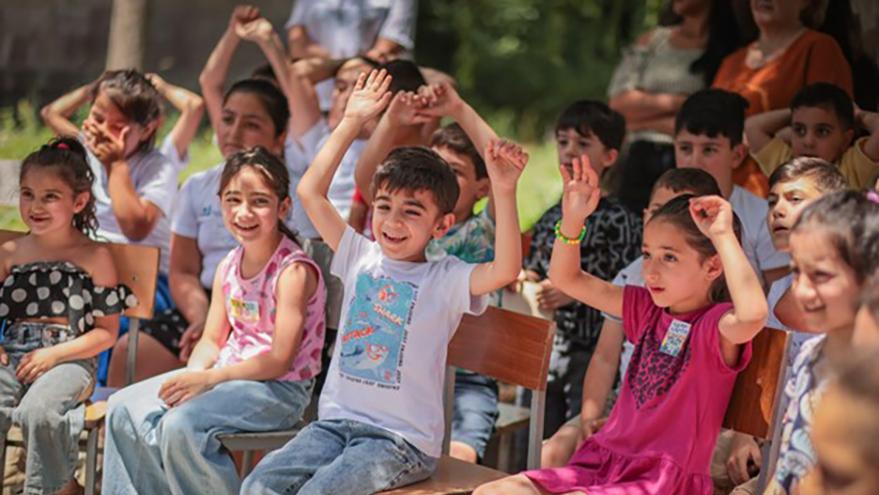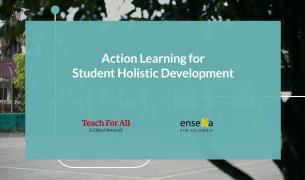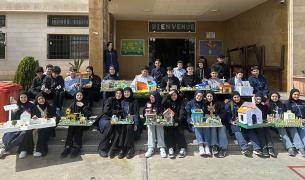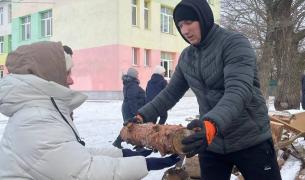From trauma to triumph: Teach For Armenia's summer camps for displaced children

“Good, very good, wonderful!”
These were the first words we heard when we arrived in the village of Noyakert and greeted the students who were going to participate in our Teach For Armenia summer camp. At first glance, it seemed like a small, pleasant way to interact with the children. But that day, all I could think about was that these children truly are good, very good, wonderful.
In September 2023, the conflict in Nagorno-Karabakh, known as Artsakh to Armenians, resulted in the forced displacement of over 100,000 people, including approximately 21,000 school-age children. These families, now scattered all across Armenia, have faced immense challenges, particularly in continuing the education of their children.
As one of the largest educational organizations in Armenia working in underserved communities throughout the country, Teach For Armenia couldn't remain indifferent to the crisis. Staying true to our commitment to educational equality, in October 2023, we launched our Emergency Response.
We have been leading a project that supports 1,500 displaced children, focused on providing social-emotional learning to help them cope with their traumas.
Sadly but understandably, when we assessed their needs, 87% of the children showed various signs of trauma. These ranged from frequent crying and unexpected fears to mutism. Thanks to the dedicated work of our mental health and psycho-social Support Specialists and EiE Coordinators, we have found different ways to effectively address these challenges such as offering one-on-one counseling sessions and integrating therapeutic activities like art and play therapy into the daily schedule. These approaches were designed to create safe and supportive environments within the camps and help children express their emotions, rebuild trust, and gradually regain a sense of normalcy and security. The combined efforts of our team ensured that the children received the specialized care they needed to overcome their trauma and begin to heal.
Through the assessment process, we also recognized that trauma isn't the only hurdle facing these children. Continuing issues displaced students struggle with include:
-
Feeling like temporary guests in new communities, struggling to adapt socially and culturally without losing their identity.
-
Persistent gaps in knowledge due to interrupted education, particularly in STEM and foreign languages.
-
Limited opportunities to engage in extracurricular activities within their new communities.
While Teach For Armenia has a tradition of organizing summer camps every year through their Summer Academy for various age groups, this particular initiative was unprecedented. It was the first time the organization tailored a camp experience specifically to address the complex needs of children affected by displacement and trauma, combining academic support with mental health and psycho-social interventions. Nevertheless, when the idea of hosting these summer camps was proposed, our response was unanimous: “Good, very good, wonderful!”
And so, these summer camps have become a reality in 23 communities across Armenia, welcoming 1,000 displaced and local children. The camps offered puppet theater, lessons in national musical instruments and dance, catch-up academic classes, and culinary experiences—all tailored to meet the students’ needs.
Our goal is to create a safe space where children who've been through difficult times can rediscover happiness. Through these diverse activities, we want to help them reconnect with their interests, feel secure again, and simply have fun.
The journey has been filled with countless stories of resilience and progress and the post program survey results highlight its significant positive impact on displaced children from Artsakh. A substantial majority of parents, students, and school principals reported improvements in the students' academic performance, emotional well-being, and integration into new school environments. Specifically, 90% of principals and over 70% of parents noted academic improvements, while over 80% of parents and 95% of principals observed positive changes in behavior and emotional state.
One principal shared, “The program has been transformative for our students, giving them the support they needed to feel safe and excel academically despite their difficult circumstances.” This sentiment echoes the broader survey findings, where 91% of students, 85% of parents, and 90% of principals rated the overall impact of the program as 9 or 10 out of 10, underscoring the program’s success in fostering resilience and academic progress among displaced students.
Still, despite our results and significant progress in the social-emotional state of the students, there is yet more work to do to help the children fully overcome their challenges and effectively enroll in the education system in their new communities. A new one-year program will allow us to transition from the acute emergency response phase to the recovery phase,by addressing the remaining barriers faced by the displaced children. Through remedial classes in literacy and numeracy and social-emotional learning activities, we’ll continue to work to ensure their complete recovery, integration into their new communities, and improved academic performance.
We're here for the long run, too. We want to make sure they and their families have everything they need to move forward. Our summer camps are more than just a break, they're a stepping stone towards healing and rebuilding, one positive experience at a time. Because ultimately, the best answer to “How are you?” is a genuine “Good, very good, wonderful!”


